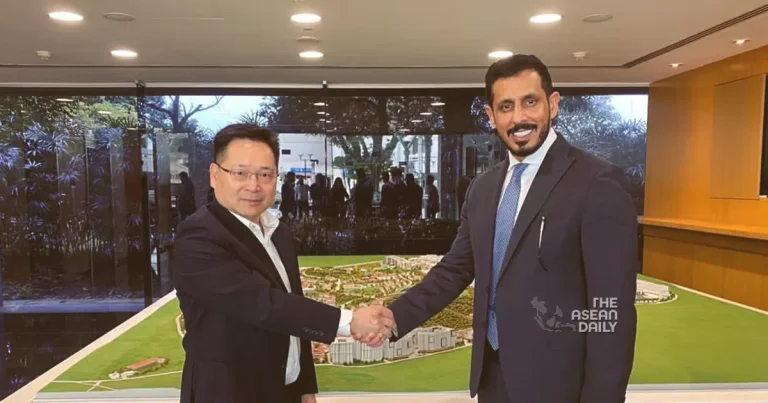14-11-2023 (SINGAPORE) The United Arab Emirates’ (UAE) head of anti-money laundering, Mr Hamid Al Zaabi, has commended Singapore’s handling of a high-profile $2.8 billion money laundering investigation, describing it as a case of global significance. Mr Al Zaabi, director-general of the UAE’s Executive Office of Anti-Money Laundering and Counter Terrorism Financing, expressed hope that the bust would inspire other jurisdictions to take similar measures in combating the issue.
While some commentators have criticized the scale of the bust as indicative of weaknesses in Singapore’s national anti-money laundering and counter-terrorism financing system, Mr Al Zaabi vehemently disagreed. According to him, the case highlights two important factors: the extensive global operation of money laundering and Singapore’s unwavering determination to pursue wrongdoers, regardless of their size or influence.
The $2.8 billion money laundering case is the largest of its kind in Singapore and has garnered international attention. Mr Al Zaabi is currently in Singapore leading a delegation of Emirati authorities with the aim of strengthening collaboration in the fight against financial crime.
Mr Al Zaabi stressed that both the UAE and Singapore are renowned financial hubs, attracting legitimate investments as well as criminal elements such as organized crime groups seeking to launder illicit proceeds. He described organized crime as a cancer that inflicts harm in various ways and emphasized that money laundering poses significant risks to economic stability, undermining competition, hindering growth, deepening inequality, and eroding confidence in the global financial system’s integrity.
Given that money laundering often occurs across jurisdictions, Mr Al Zaabi emphasized the need for international cooperation to effectively address the problem. He asserted that international cooperation becomes challenging only if parties make it so, highlighting the importance of trust and established personal relationships not only among law enforcement agencies but also in judicial cooperation for the extradition and prosecution of criminals.
Several individuals implicated in Singapore’s money laundering case have connections to the UAE through properties, business investments, and personal relations. Cypriot national Wang Dehai, for instance, stated in court that he purchased a $23 million condominium unit at The Marq on Paterson Hill with proceeds from real estate investments in Dubai. Singaporean authorities have seized $43 million in assets from Wang, who faces charges under the Corruption, Drug Trafficking and Other Serious Crimes (Confiscation of Benefits) Act.
Another suspect, Su Jianfeng, claimed to be a property agent in Dubai, owning multiple properties there worth a total of 30 million dirhams (S$11 million), along with a bank account containing three million dirhams. Zhang Ruijin and Lin Baoying, also linked to the case, revealed they have siblings residing in the UAE, and Lin disclosed her ownership of a residential property in the UAE valued at $3.7 million.
While Mr Al Zaabi refrained from commenting on the specifics of the ongoing investigation, he assured that the Emirati authorities are taking the matter seriously and maintain close cooperation with their Singaporean counterparts to bring criminals to justice. He highlighted that laundered funds are used by criminals for various purposes, including extravagant lifestyles, luxury assets, corruption, drug trafficking, and even terrorism financing, citing recent news reports on the financial system of Hamas.
The Financial Action Task Force (FATF), an intergovernmental organization combatting money laundering, identifies jurisdictions with inadequate measures to counter money laundering and terrorist financing, placing them on a blacklist. The UAE was placed on the grey list in 2022, signifying its active cooperation with the FATF to address deficiencies in its anti-money laundering regime. Mr Al Zaabi regarded this as a positive development, as the FATF’s assistance has helped the UAE enhance its processes significantly.
Mr Al Zaabi’s office has investigated 183 new money laundering cases from March to mid-July this year, resulting in the seizure of over 1.3 billion dirhams worth of assets linked to financial crime. During this period, fines amounting to over 199 million dirhams were issued, and convictions for money laundering offenses achieved a 92% success rate. Additionally, the UAE’s Ministry of Interior reported dealing with 521 money laundering cases over the past two years, leading to the confiscation of more than 4 billion dirhams in illicit funds. The authorities have also collaborated with international law enforcement agencies to arrest 387 globally wanted individuals.
As criminals continually evolve and employ sophisticated tactics to evade detection, Mr Al Zaabi emphasized the need for law enforcement to strengthen international cooperation, invest in training, talent, and innovative technologies. He acknowledged the similarities between the UAE and Singapore and expressed a desire to learn from Singapore’s best practices, particularly in terms of its robust system, experience, good reports, and strong public-private partnerships. Mr Al Zaabi emphasized the goal of building a stronger working relationship between the UAE and Singapore in combatting financial crime.




